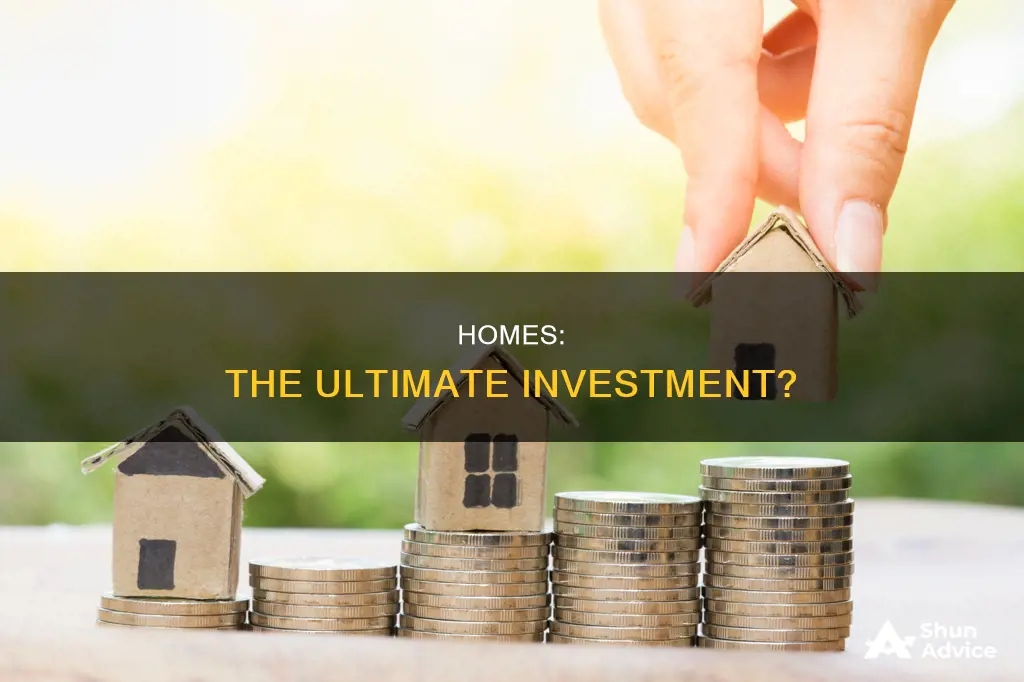
For many people, their home is their biggest investment. This is partly because homes are typically purchased with a large amount of leverage, meaning that even a mediocre return can turn into a significant increase on the money invested. However, this also means that homes can become a liability if their value decreases.
Homes are also illiquid assets, and people have little control over when they buy or sell them. This can lead to people buying high and selling low, as was seen during the 2008 financial crisis.
There are also high carrying costs associated with owning a home, including monthly mortgage payments, real estate taxes, insurance, and utilities.
Despite these drawbacks, homeownership can be a good investment for those with stable jobs who plan to live in the same area for a long time. This is because homes provide a place to live rent-free, which has a real cash value. Additionally, the tax code provides advantages to homeowners, such as tax-deductible interest payments on mortgages.
| Characteristics | Values |
|---|---|
| Homes are a good investment because | They are a tangible asset, and people feel more comfortable investing in something they understand. |
| They are a hedge against economic instability and inflation. | |
| They are a forced savings account, as mortgage payments contribute to home equity. | |
| They appreciate in value over time. | |
| They can be leveraged to borrow money. | |
| They provide a place to live, and you can live there rent-free. | |
| Homes are a bad investment because | They lock people to a location, making it harder to move for jobs. |
| They are illiquid, and there are high transaction costs associated with buying and selling. | |
| They are a volatile asset, and there is a risk of negative equity. | |
| They are not a true investment as they have a primary purpose of providing shelter. | |
| They do not generate cash flow and have high carrying costs. |
What You'll Learn
- Homes are a good investment due to their value appreciation over time
- The prospect of an increase in value alone does not make a house a true investment
- A house is not an investment if it's your primary residence
- A house can only be an investment if you plan to sell it
- The carrying costs of owning a home are too high for it to be an investment

Homes are a good investment due to their value appreciation over time
The US real estate market has a long and reliable history of increasing in value over time. While there are no guarantees, and markets do fluctuate, the annual return on housing in 16 wealthy countries between 1870 and 2015 was over 7% when adjusted for inflation. This demonstrates that, historically, real estate has been a strong investment that can provide substantial returns over the long term.
In addition to the potential for value appreciation, homeownership offers other financial benefits such as tax deductions, the opportunity to build equity, and the ability to borrow against the home's value. These factors contribute to the overall investment potential of owning a home.
Furthermore, owning a home provides stability and the opportunity to build wealth over time. It is a place to make memories and can offer a sense of security. While there are also expenses and maintenance costs associated with homeownership, the potential for value appreciation makes it a good investment option for those looking to build long-term wealth.
By investing in a home, individuals can benefit from the historical appreciation in value that has been observed in the real estate market. This makes homes a good investment, especially for those seeking to build wealth and enjoy the benefits of homeownership.
Investments: Your Future's Best Friend
You may want to see also

The prospect of an increase in value alone does not make a house a true investment
Firstly, a house serves a more important primary purpose of providing shelter. Therefore, it is not something that can be easily foregone, unlike other investments such as stocks or mutual funds. This lack of control over the sale of the house from an investment perspective was evident during the 2008 financial crisis when many people were forced to sell their homes at a loss due to market collapse. As a result, they experienced a negative return on their investment, buying high and selling low.
Secondly, a house can only be considered an investment if you plan to sell it and realise the profits. However, selling a house often means finding another place to live, which may require using the equity obtained from the sale to fund the new accommodation. This can result in a situation where the equity is "trapped", and true profit is not achieved unless one downgrades or moves to a rental.
Thirdly, equating a house to an investment can lead to equity stripping. While borrowing money against the equity in one's house can provide cash for other purposes, it also creates a liability and puts the house at risk. During the financial crisis, many homeowners who had taken out home equity loans or refinanced their mortgages found themselves unable to refinance again or sell their homes to move to a more affordable situation. This serial refinancing, driven by the perception of the house as an investment, led to underwater mortgages, where the amount owed exceeded the value of the house.
Furthermore, the carrying costs of owning a home are too high for it to be considered a pure investment. In addition to monthly mortgage payments, homeowners must also pay real estate taxes, insurance, private mortgage insurance (in some cases), and utilities. There are also ongoing maintenance and repair expenses, such as replacing the roof, siding, windows, flooring, and remodelling kitchens and bathrooms. These carrying costs can offset any potential profit from the sale of the house and are not typically incurred with other types of investments.
Lastly, a house, unlike other investments, does not generate cash flow unless it is an investment property that is rented out. While renting out a portion or all of the house can help pay the associated costs, it also involves significant work, money, and risk. Therefore, the prospect of an increase in value alone does not make a house a true investment; it is primarily a place to live, and any financial gains are secondary.
Investments: The Drive to Gain More
You may want to see also

A house is not an investment if it's your primary residence
While homes are often considered people's biggest investment, there are several reasons why a house is not an investment if it is your primary residence.
Firstly, a house has a more important primary purpose than being an investment – it provides you with a place to live. This means you have little control over its sale from an investment perspective, as you will likely sell it when it no longer fits your lifestyle, rather than when it is convenient in terms of a return on investment. For example, during the financial crisis of 2008, many people bought houses at high prices because they needed a home for their families, and some were then forced to sell their homes when the market collapsed, resulting in a negative return on investment.
Secondly, a house can only be considered an investment if you plan to sell it, as the only way to profit from an increase in value is to realise that gain through a sale. However, selling your house means you will have to find another place to live, and you will likely have to use the equity from the sale to fund this, trapping your equity and preventing you from making a profit unless you downgrade or move to a rental.
Thirdly, equating your house to an investment can lead to equity stripping. While you can borrow money against the equity in your house through a home equity line of credit (HELOC) or a cash-out refinance, this creates a corresponding liability, which may put your house at risk. Many people learned this the hard way during the financial crisis, as house values declined and they found themselves unable to refinance or sell their homes.
Additionally, the carrying costs of owning a home are too high for it to be considered an investment. When you buy an investment, you typically don't need to put more cash into it for it to make money for you, but with a house, you have to make mortgage payments, pay real estate taxes, insurance, and utilities, as well as cover the costs of repairs and maintenance. These "carrying costs" can be substantial and significantly impact the overall return on your investment.
Finally, your house won't generate cash flow unless you own an investment property and rent it out. While buying and managing real estate investments can be lucrative, it takes a lot of work, money, and involves a significant amount of risk.
In summary, while a house may increase in value over time, there are many reasons why it is not a true investment if it is your primary residence.
Investor Numbers: Who's in the Game?
You may want to see also

A house can only be an investment if you plan to sell it
A house is often considered a person's biggest investment, but this is not always the case. There are several reasons why a house can only be considered an investment if you plan to sell it.
Firstly, the primary purpose of a house is to provide shelter, and it is not something that can be easily dispensed with. Therefore, the decision to sell a house is often driven by factors such as a change in lifestyle or family needs, rather than solely from an investment perspective. This was evident during the 2008 financial crisis when many people were forced to sell their homes at a loss due to market conditions, resulting in a negative return on their investment.
Secondly, to profit from the appreciation of a house's value over time, it must be sold. However, selling a house usually means finding another place to live, which requires using the equity obtained from the sale to fund the new purchase. This can result in a situation where the equity is "trapped," and true profit can only be achieved by downgrading to a less expensive house or moving to a rental situation.
Additionally, the carrying costs of owning a home are high and can offset any potential profit. These costs include monthly mortgage payments, real estate taxes, homeowners' insurance, private mortgage insurance, utilities, and maintenance or renovation expenses. Over time, these expenses can add up to a significant amount, reducing the overall return on investment.
Furthermore, a house does not provide any cash flow or dividends to the owner, unlike other investments such as stocks or bonds. While it is true that homeowners can live in their house rent-free, the opportunity cost of this benefit should also be considered.
Lastly, the appreciation of property values is not guaranteed. As seen during the 2008 financial crisis, property values can remain flat or decline, turning a house into a major liability instead of an asset.
In conclusion, while a house can be a good investment under certain circumstances, it is essential to approach homeownership with a realistic understanding of the potential risks and limitations involved.
Wealthy Secrets: Where the Rich Invest
You may want to see also

The carrying costs of owning a home are too high for it to be an investment
Owning a home is often considered one of the biggest investments a person can make. However, the carrying costs of owning a home can be high and may impact the return on investment.
Carrying costs, also known as holding costs or carrying charges, are the fees associated with owning a property. These costs can include property taxes, insurance, utilities, condo fees, maintenance, and more. They are ongoing and recurring expenses that need to be paid in addition to the monthly mortgage payments. For example, property taxes are used to pay for municipal services such as snow removal, garbage disposal, and road maintenance. These taxes are typically calculated based on the value of the home, its relative value in the neighbourhood, size, age, and location. Home insurance is another carrying cost that protects the home and its contents against damage, vandalism, and theft. The cost of insurance is determined by factors such as the home's location, neighbourhood, construction, age, and value.
Other carrying costs include utilities such as hydro, gas, heating, cable, phone, and internet. These costs can vary depending on the size of the house, the number of occupants, the type of appliances, and the season. For instance, heating bills tend to be higher during colder months. Additionally, landscaping, yard work, home cleaning, roof maintenance, and HVAC care are also common carrying costs that require a significant amount of time and financial investment to maintain.
It is important for homeowners to consider and budget for these carrying costs before purchasing a home. These costs can fluctuate and have a negative impact on property owners if not properly accounted for. By understanding and quantifying these expenses, homeowners can determine how much rent to charge tenants to ensure their expenses are covered.
In summary, while owning a home can be a significant investment, the carrying costs associated with it can be substantial. These costs must be carefully considered and managed to ensure they do not outweigh the potential financial benefits of homeownership.
Investments: Where People Put Their Money
You may want to see also
Frequently asked questions
A home is often one of the biggest investments a person will make in their lifetime. Historically, real estate values tend to increase over time. According to Zillow, the average value of a home in the US has continued to trend upwards. For example, a home purchased for $250,000 in 2020 would be worth about $350,000 in November 2023.
While homes generally increase in value over time, there is a risk of negative returns if one has to sell the home during an economic downturn. For example, during the financial crisis of 2008, many people bought houses at high prices and were then forced to sell them at a loss when the market collapsed.
It is important to regularly maintain your home to prevent problems that could destroy its worth. Regular inspections can help identify issues such as water damage, which can be costly to repair and may reduce the value of your home. Keeping your home well-maintained can also help you avoid costly renovation expenses.







